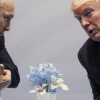
President Donald Trump and Russian President Vladimir Putin stroll collectively on the G20 summit in Osaka, Japan, on June 28, 2019.
Susan Walsh/AP
disguise caption
toggle caption
Susan Walsh/AP
President Trump’s cozying as much as Russian President Vladimir Putin marks a big departure from many years of U.S. international coverage.
For years, U.S. insurance policies have been in place to isolate Russia over its full scale invasion of Ukraine, however the Trump administration is now poised to make a cope with the Kremlin to finish the battle with out Ukraine having a lot of a say.
Secretary of State Marco Rubio and Nationwide Safety Advisor Mike Waltz held talks with Russian officers final week to start hammering out a Russia-Ukraine peace deal. Ukrainian officers say they weren’t invited.
In the meantime, President Trump is falsely blaming Ukraine, a U.S. ally, for beginning the battle three years in the past. Even earlier than these occasions, Trump was already exhibiting willingness to deal with different allies adversarially, together with these from NATO – a partnership fashioned after the defeat of Nazi Germany in World Conflict II.
Morning Version is exploring the repercussions of America’s international coverage reversals and realignments underneath President Trump with totally different writers, analysts and leaders.
Historian and author for The Atlantic Anne Applebaum says this departure from conventional U.S. international coverage is “radical” on condition that Russia is a each day menace to the remainder of Europe.
Applebaum, who final yr printed the Pulitzer Prize-winning Autocracy Inc. The Dictators Who Need to Rule the World, provides that Trump’s maneuvering is elevating considerations not simply in Europe but in addition within the capitals of allies all over the world.
She shared these ideas and extra in an interview with NPR’s Leila Fadel about what Trump’s strategy means for international stability:
What Trump’s willingness to work with a dictator indicators to the remainder of the world
U.S. international coverage has for about 80 years been primarily based on a community of alliances and establishments that allowed the nation “to project power, to create zones of prosperity, to enjoy trade with like-minded partners,” Applebaum stated, noting that it prolonged primarily to Europe but in addition labored in Asia.
Trump is successfully signaling that he is now not involved in listening to from European allies, Applebaum stated, and that he is aligning with an influence that may be a each day menace to Europe. She notes that there are frequent incidents of sabotage within the Baltic Sea and nearly each day cyberattacks throughout the continent from Russian hacking teams.
“By doing that, Trump is saying, ‘I don’t care anymore about alliances. I’m not interested in your opinions. I’m going to do a deal with this dictator over your head,'” Applebaum stated. “And that’s a message that is heard not just in every European capital, but in every allied capital around the planet as a sign that the U.S. is changing.”
Shifting away from allies raises financial considerations and questions on stability
Trump’s strategy up to now has so many implications that “they’re almost hard to think through,” Applebaum stated.
“What happens to our trade relationships with Europe and with Asia? What about the US companies that have enjoyed special favor in those markets?” Applebaum stated.
She notes that U.S. protection firms, nuclear energy firms, and varied different utility suppliers have been welcomed by these international locations as a result of “as a way of expressing their fealty to the United States.”
After which there are considerations about peace. What occurs to treaties not simply on commerce, however treaties on the legal guidelines of battle, Applebaum wonders.
“All these things that have governed U.S. behavior and allied behavior all over the world for 80 years, now disappear,” Applebaum stated.





